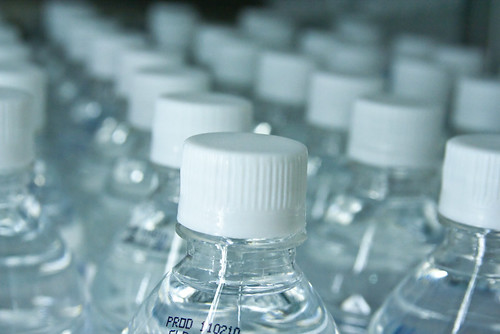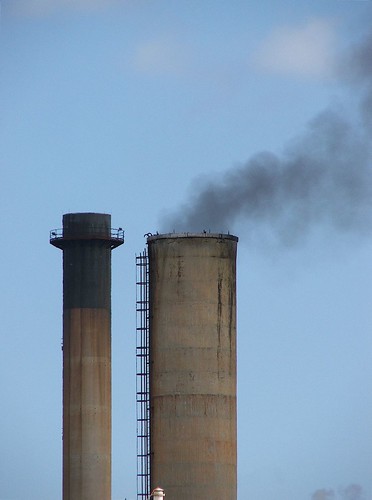As an average American citizen, I recognize that I am often somewhat wasteful. Living in a medium-sized city in a first world country means I often take for granted money and resources that are so precious to less fortunate people around the world. I try my best to conserve resources and preserve our environment, but I'll be the first to admit that it is difficult, and I'm nowhere near perfect. However, there is one particularly wasteful habit I refuse to develop: drinking bottled water. The manufacture and consumption of bottled water wastes money and resources, and it is harmful not only to our environment, but to our own health as well.
 |
| From Flickr by stevendepolo |
Fact: bottled water is less regulated than tap water. This means that while the manufacturers of tap water are required by law to provide their source, bottled water producers are not. While tap water is strictly tested for traces of the E. coli bacteria, bottled water is not. While tap water distributors must produce a quality report, the quality of bottled water is largely a mystery. Because commercially bottled water frequently does not cross state lines, about 70% is not subject to FDA testing or regulation. This blatant lack of supervision over such an unfortunately popular product could have serious implications for human health. Bacteria could be present in unhealthy amounts in such an unregulated item, and the plastic bottles may leach chemicals into the water if reused or left in the heat. Although this risk is uncertain and evidence of serious negative effects has not yet been officially uncovered, drinking water from the tap is a safer, if slightly less convenient, way to hydrate our bodies.
Not only is our health threatened by bottled water, but our wallets are in danger as well. Bottled water is ten thousand times more expensive than tap water. Let me repeat that: ten thousand times more expensive. In the United States especially, municipal water supplies are very cheap for the consumer. Bottled water, on the other hand, is enormously expensive. We—the consumer—aren't paying for the water itself when we hand over one, two, even three dollars for that seemingly innocent bottle of H2O—we are paying for the seventeen million barrels of oil used each year to produce the plastic, the paper of the wrapper, and even the cardboard packaging for bottled water. In fact, 40% of bottled water comes straight from the tap, making it virtually free for the producer. All they have to do is wrap it up and charge the uninformed masses for the expensive waste and pollution they have generated.
 |
| From Flickr by KNOW MALTA by Peter Grima |
Such profligate behavior as this has serious consequences for our environment. Only one in five plastic water bottles is recycled. The other four are simply thrown away—that is, if they even make it to a garbage can. Bottled water is responsible for 1.5 million tons of plastic waste every year, much of which ends up in the ocean. In conjunction with plastic grocery bags, plastic water bottles have created an enormous floating trash island in the Pacific Ocean—and it is only growing. However, pollution to the land and ocean is not even the half of it. The process of bottling water requires three times more water than is actually in the final product, and freshwater is a dwindling resource. Only 2% of the world's water is freshwater, and most of that is trapped in glaciers. In addition, oil and other fossil fuels are wasted in the manufacturing of bottled water. Not only are we running out of fossil fuels—a nonrenewable resource—but burning this fuel is also detrimental to the environment. The combustion of fossil fuels releases carbon dioxide, which collects in the troposphere and increases the greenhouse effect, leading to the well-known phenomenon of global warming. With so many other sources—such as motor vehicles, industrial activity, and agriculture— advancing this environmental disaster, it seems idiotic to further contribute to greenhouse gas emissions for something as worthless and wasteful as bottled water.
Is the convenience of a portable and disposable container of hydration worth the high health, financial, and environmental costs? I don't think so. To me, the choice is obvious: purchase a sturdy metal or plastic water bottle and fill it with tap water before you leave the house in the morning. You can refill it at school from the water fountains or at work from the water coolers. You really only have to use it a few times before it pays for itself. I know there are much more serious and pressing issues out there than the good ole bottled water vs. water bottles debate, but when it comes to preserving and protecting our planet, every little bit counts. In the words of an ancient Native American proverb: "Treat the earth well: it was not given to you by your parents, it was loaned to you by your children."
Is the convenience of a portable and disposable container of hydration worth the high health, financial, and environmental costs? I don't think so. To me, the choice is obvious: purchase a sturdy metal or plastic water bottle and fill it with tap water before you leave the house in the morning. You can refill it at school from the water fountains or at work from the water coolers. You really only have to use it a few times before it pays for itself. I know there are much more serious and pressing issues out there than the good ole bottled water vs. water bottles debate, but when it comes to preserving and protecting our planet, every little bit counts. In the words of an ancient Native American proverb: "Treat the earth well: it was not given to you by your parents, it was loaned to you by your children."
Works Cited
Baskind, Chris. "5 reasons not to drink bottled water | MNN - Mother Nature Network." Environmental News and Information | MNN - Mother Nature Network. Mother Nature Network, 15 Mar. 2010. Web. 17 Jan. 2011. <http://www.mnn.com/food/healthy-eating/stories/5-reasons-not-to-drink-bottled-water>.
"The Facts About Bottled Water." Online Education : Colleges, Universities, Schools, Courses, & Degrees. Online Education, n.d. Web. 17 Jan. 2011. <http://www.onlineeducation.net/bottled_water>.
"The Facts About Bottled Water." Online Education : Colleges, Universities, Schools, Courses, & Degrees. Online Education, n.d. Web. 17 Jan. 2011. <http://www.onlineeducation.net/bottled_water>.